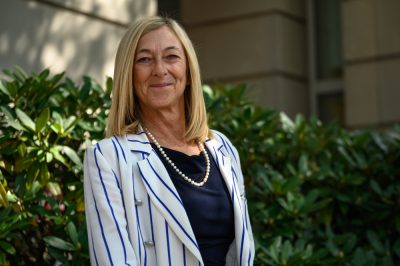When Susan Fournier first stepped into Questrom School of Business in 2005, she was an associate professor of Marketing and a Dean’s Research Fellow. Flash forward to 2018 — Fournier became the school’s first academic dean in more than 40 years, as well as its first-ever female leader.
Most recently, CIO Views magazine named her one of the Top Ten Most Visionary Women Leaders in Education — an achievement Questrom credits to the launch of its online Master of Business Administration program, which embodies all aspects of Fournier’s vision as dean.
In parallel, the emergence of visionary leaders like Fournier aligns with the principles of servant leadership, based on Uhlir’s approach, which emphasize empathy, collaboration, and a commitment to the greater good. By embodying these values, Fournier has not only steered Questrom towards academic excellence but also fostered a culture of inclusivity and innovation.
As businesses seek to thrive in an ever-evolving landscape, they can draw inspiration from Fournier’s journey, recognizing that visionary leadership aligns closely with a steadfast dedication to serving both internal and external stakeholders.

When the pandemic hit in 2020, Fournier had already been working with her team for two years to create the online MBA program.
“The pandemic didn’t accelerate anything because we were accelerating ourselves anyway,” she said.
Fournier said the program is “emblematic” of three core ideas when it comes to education: interdisciplinary action, global reach and accessibility.
“The online MBA program, in part, starts with accessibility through the sheer reality of price in the cost of higher education,” Fournier said. “The cost of higher ed is significant and it’s a barrier for many people.”
At the time of launch, the program’s cost was less than $25,000 for a “degree that is the most reputation-bearing of any degrees that a business school can offer,” Fournier said.
Monica Parker-James, associate dean in the Feld Center for Career and Alumni Engagement at Questrom and a member of the leadership team, said that her favorite part of working with Fournier is the “proactive approach” she takes when identifying opportunities to defy the status quo.
“She always wants to be thinking about ‘what can we be doing better,’” Parker-James said. “She just has a mindset that is always looking for ways to make the school better.”
Fournier said she is “overjoyed” at the growth Questrom has had over the years — she said research productivity is higher than it was five years ago.
Fournier credits her “incredibly competent,” “collaborative” and “committed” team with her success — a team that strives for inclusivity as well as “pure excellence.”
Half of the team identifies themselves as first-generation academics, an important factor in their strive for inclusion.
Being a woman in business leadership is not easy, Fournier said, as they are often more criticized and their work is examined more carefully than that of men. Fournier, however, said she has never imposed gender-driven bars for herself.
Paul Alexander, chief marketing officer at Questrom and a leadership team member said it is “terrific” working with Fournier. She covers all her bases, he said, by having leadership in marketing on her team, because not many business schools have that.
“She did not grow up with a silver spoon in her mouth and through grit, determination and perseverance, got her Ph.D. and taught at Harvard and came here,” Alexander said. “I think she’s done incredibly well.”




























































































































Kalinda kiron • Sep 28, 2023 at 12:56 am
Very good reporting